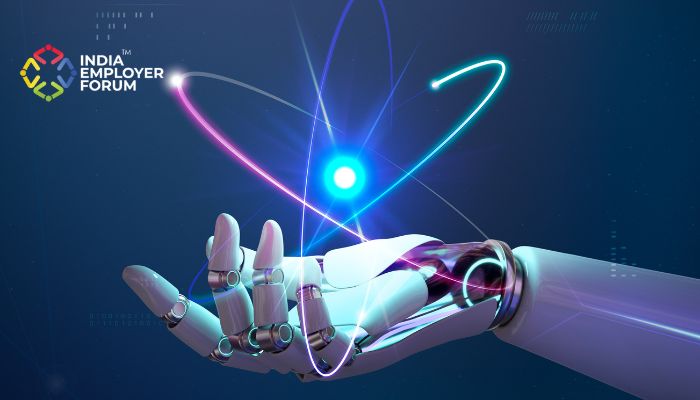Artificial Intelligence (AI) is rapidly transforming industries across the globe, and recruitment is no exception. Nowadays, where efficiency and precision are paramount, AI is revolutionising how companies attract, assess, and hire talent. As organisations strive to stay competitive, the integration of AI in recruitment processes is proving to be a game-changer, offering unprecedented benefits while also presenting new challenges.
AI in hiring refers to the use of artificial intelligence technologies, such as machine learning algorithms, natural language processing (NLP), and predictive analytics, to streamline and enhance various stages of the recruitment life cycle. These technologies enable recruiters and HR professionals to make data-driven decisions, improve the candidate experience, and optimise workforce planning. By leveraging AI, companies can analyse vast amounts of data quickly and accurately, making the recruitment process more efficient and effective.
The growing importance of AI in recruitment
The increasing reliance on AI in recruitment is driven by several factors. The sheer volume of applications received by large organisations makes manual screening both time-consuming and prone to errors. AI tools can process thousands of resumes in a fraction of the time, ensuring that no qualified candidate is overlooked. Additionally, as the job market becomes more competitive, companies are under pressure to attract top talent quickly. AI not only speeds up the hiring process but also improves the quality of hires by matching candidates more accurately to job roles.
Benefits of AI in hiring
One of the primary benefits of AI in hiring is improved efficiency. AI-powered tools automate repetitive tasks like resume screening, initial candidate assessments, and interview scheduling, significantly reducing the time-to-hire. This allows HR teams to focus on more strategic aspects of recruitment, such as candidate engagement and employer branding.
Enhanced candidate matching is another key advantage. Advanced algorithms analyse large volumes of data, including candidates’ skills, experience, and personality traits, to identify those who align best with job requirements. This leads to better job fit and higher retention rates, as employees are more likely to thrive in roles that match their strengths and preferences.
AI also has the potential to reduce bias in hiring decisions. Traditional hiring processes can be influenced by unconscious biases, leading to unfair outcomes. By focusing solely on candidate qualifications and performance metrics, AI can help create a more level playing field. However, it’s essential to ensure that AI systems are designed and trained to avoid perpetuating existing biases.
Furthermore, AI’s predictive analytics capabilities allow organisations to forecast future hiring needs and trends. By analysing historical data and market trends, AI can predict when and where talent shortages may occur, enabling proactive recruitment strategies. This ensures that companies have the right talent in place to meet future business demands.
AI tools transforming recruitment
Several AI tools are making significant strides in transforming recruitment. For example, resume parsing algorithms can sift through resumes to identify key skills and qualifications, matching them against job descriptions with remarkable accuracy. This not only speeds up the screening process but also ensures that candidates with the right qualifications are prioritised.
AI-powered chatbots are becoming increasingly popular for engaging with candidates. These chatbots can answer frequently asked questions, schedule interviews, and provide real-time feedback, thus enhancing the candidate experience. By offering 24/7 support, chatbots ensure that candidates receive timely responses, improving their overall perception of the company.
Video interview analysis tools are another innovation in AI recruitment. These tools use NLP algorithms to assess candidate suitability beyond the resume by analysing facial expressions, tone, and language used in video interviews. This provides recruiters with deeper insights into a candidate’s personality and communication skills, which are often critical for success in certain roles.
Additionally, predictive analytics platforms leverage AI to analyse workforce data, predict turnover rates, and recommend retention strategies. By identifying patterns in employee behaviour, these tools can help organisations take proactive steps to retain top talent and reduce turnover.
Challenges and considerations
Despite its numerous benefits, AI in hiring poses several challenges. Algorithmic bias is a significant concern, as AI systems may inherit biases present in historical data. For example, if a company’s past hiring decisions were biased against certain demographic groups, the AI system may continue to favour candidates from similar backgrounds. This underscores the importance of using diverse and representative data sets when training AI models.
Privacy concerns also arise from the collection and analysis of large amounts of candidate data. With increasing scrutiny on data protection, organisations must ensure that they comply with regulations such as GDPR and CCPA. This includes obtaining explicit consent from candidates before processing their data and implementing robust security measures to protect sensitive information.
Moreover, integrating AI solutions with existing HR systems can be complex and costly. Organisations may need to invest in new infrastructure, software, and training to fully leverage AI’s potential. Resistance to change among HR staff is another potential barrier, as some may be hesitant to adopt new technologies or fear that AI could replace their roles. To address these concerns, companies should emphasise the complementary nature of AI, highlighting how it can enhance rather than replace human decision-making in recruitment.
Future trends and outlook
The future of AI in recruitment holds immense promise. As technology continues to evolve, AI-powered recruitment tools will become more sophisticated, offering deeper insights into candidate behaviour and performance. For example, AI could eventually predict a candidate’s long-term potential within a company based on their learning agility, cultural fit, and adaptability.
Advancements in AI ethics and transparency are expected to address concerns surrounding bias and privacy, fostering greater trust in automated hiring processes. Companies are likely to adopt more transparent AI systems, where the decision-making process is explainable and auditable. This will help ensure that AI-driven recruitment is fair, ethical, and aligned with organisational values.
In addition, the integration of AI with other emerging technologies, such as blockchain and augmented reality (AR), could further revolutionise recruitment. For instance, blockchain could be used to verify candidate credentials and work history, while AR could create immersive virtual job previews that allow candidates to experience the role before applying.
Ultimately, AI is not just a buzzword but a transformative force in the recruitment landscape. By harnessing the power of AI, organisations can streamline hiring processes, enhance candidate experiences, and make informed, data-driven decisions. Staying abreast of these developments will be crucial for HR professionals looking to optimise their recruitment strategies and remain competitive in an increasingly digitised world.
As AI continues to shape the future of recruitment, organisations that embrace this technology will be better positioned to attract and retain top talent. However, it’s important to approach AI with caution, ensuring that ethical considerations and human oversight remain at the forefront of its implementation. By doing so, companies can harness the full potential of AI while fostering a fair and inclusive hiring process.
References:
- The AI Revolution: Transforming Sourcing & Hiring in Recruitment | All-Star Search | Jun 2024
- AI in Recruiting: Transforming Hiring with Technology in 2024 | People Box | Apr 2024
- The AI Revolution: Transforming the Recruitment Process | Medium | Apr 2024
You might also be interested to read: Revolutionise Your HR Processes: Top 5 HR Tools for Streamlined Operations






